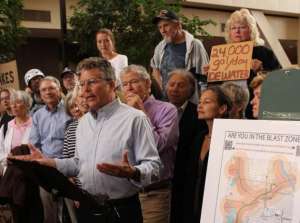The following article by Dylan Thomas appeared in the September 10, 2014 online edition of the Southwest Journal.
Lawsuit Filed Over Southwest LRT Environmental Review
George Puzak, a former Park Board commissioner, spoke Monday for the Lakes and Parks Alliance of Minneapolis. Dylan Thomas
Lakes and Parks Alliance of Minneapolis wants a federal judge to void municipal consent votes
A Minneapolis citizens group filed suit in federal court Monday aiming to halt work on the $1.65-billion Southwest Light Rail Transit project until an environmental impact study is completed.
The Lakes and Parks Alliance of Minneapolis is asking a federal judge to nullify the municipal consent votes cast by the five cities on the 16-mile light rail route and Hennepin County. It argues the Metropolitan Council violated state and federal laws by forcing the votes to approve or disapprove the design before an environmental study of a shallow tunnel in Minneapolis’ Kenilworth Corridor was completed.
Listed as defendants in the 24-page complaint are the Federal Transit Administration, Metropolitan Council and Met Council Chair Susan Haigh.
“We are here because we expect our government, specifically the Met Council, to respond to repeated citizen requests to follow state and federal laws; that is, to complete a thorough environmental study of Southwest LRT before taking actions that we are convinced will harm our treasured lakes and parks and threaten the safety of citizens,” said George Puzak, a Lakes and Parks Alliance of Minneapolis board member, at a Monday press conference inside the Hennepin County Government Center.
A draft environmental impact statement, or DEIS, on the Southwest light rail project was made public two years ago, in October 2012. That document didn’t review the potential impact of tunneling in the Kenilworth Corridor, since it wasn’t a part of the project at that time. The tunnel plan was finalized only in July, and a supplementary DEIS isn’t expected to be made public until January.
Met Council officials have described municipal consent and environmental review as separate but parallel processes. If the supplemental DEIS raises significant concerns, it could return to cities for another round of municipal consent.
In a statement released Monday afternoon, the Met Council declined to comment on ongoing litigation. Last month, the FTA declined to stop funding for the project in response to a Lakes and Parks Alliance request.
Puzak said running light rail next to freight rail trains that regularly carry “highly flammable” ethanol poses a risk of derailment or even explosion. At the press conference, where Puzak appeared surrounded by about 30 supporters, the Lakes and Parks Alliance displayed signs showing a “blast zone” extending several blocks into residential neighborhoods near the line.
Puzak also warned of the “disastrous impact” of tunneling between Lake of the Isles and Cedar Lake. Although a study commissioned by the Met Council turned up no fatal flaws in the tunnel plan, opponents worry tunnels could impede the flow of groundwater in the area or that removing water from the tunnels could pollute the lakes.
Puzak went on to argue that the line, as planned, avoids the densest residential neighborhoods of Minneapolis and will not serve those who need transit most.
“It would hardwire transportation inequities into the regional infrastructure for generations to come,” he said.
The Met Council plans before the end of September to apply to the FTA to begin final engineering. It aims to secure full funding for the project by 2016 and begin construction that same year.
Federal dollars are expected to cover 50 percent of the project’s capital cost, and supporters worry that a delay could put Southwest light rail behind other transit projects around the country all vying for the same pool of funds. Asked to comment on the lawsuit’s potential to derail that process, Tom Johnson, the attorney representing the alliance, responded: “That’s not our issue.”
“Our issue is whether or not the environmental review laws have been complied with,” Johnson said.
On Monday, the crowd behind Puzak included a contingent from the Kenwood neighborhood along the Kenilworth Corridor, including several current and former Kenwood Isles Area Association board members. Southwest LRT opponents have been characterized as NIMBYs who would simply rather see the train run somewhere else, but Puzak said that’s inaccurate.
“Our base of support encompasses a broad cross-section of locations, backgrounds and cultures, and it’s expanding every week,” he said.
Among those supporters is Bill Dooley, who lives several miles from the proposed line in the Kenny neighborhood. Dooley, a bicyclist and transit user who said he rides the Green Line light rail train between Minneapolis and St. Paul almost daily, said plans to tunnel near the lakes made him “really nervous.”
“I mean, sure, the people who live near it have some concerns, but there are people all over Minneapolis who bike through that area or walk through that area or enjoy the lakes who don’t live anywhere near the lakes who are concerned that it’s going to wreck the lake or wreck the water levels,” he said.

